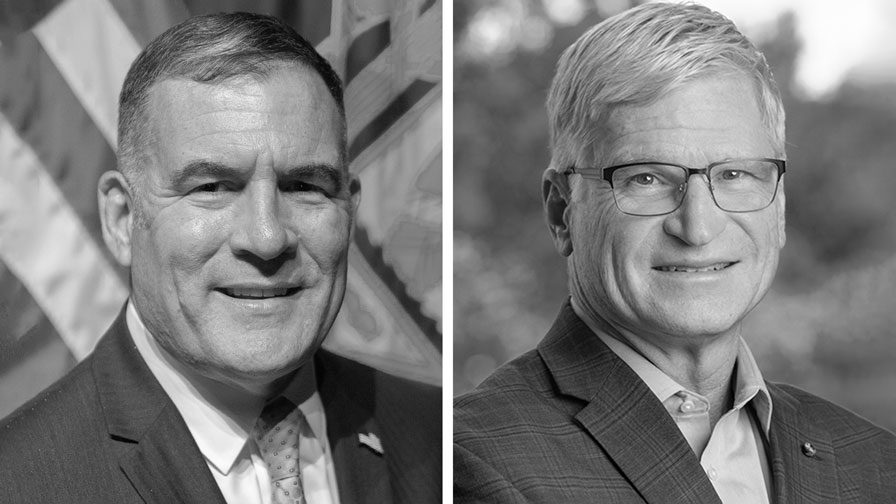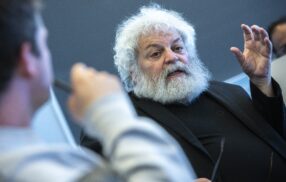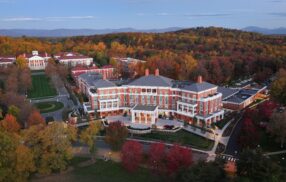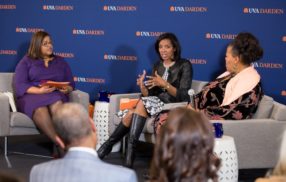
Leadership Unscripted: Naval Academy Leader Shares Lessons for Public and Private Sector Leaders
By Caroline Newman
Speaking to a crowd of students, faculty members and colleagues on Friday night near the nation’s capital, retired U.S. Marine Joe Thomas outlined a blueprint for developing moral, empathetic leaders who can bring a nation together rather than fracture it further.
As part of the University of Virginia Darden School of Business “Leadership Unscripted” series at UVA Darden DC Metro, Thomas spoke candidly with his Darden colleague, Professor Tim Laseter, about his experience teaching ethics and leadership at the U.S. Naval Academy, where he serves as director of the VADM James B. Stockdale Center for Ethical Leadership.
Thomas has taught at the Naval Academy for 19 years after retiring from the Marine Corps, which he joined at the age of 19 as a high school graduate. Together, Thomas and Laseter, who specializes in operations strategy, innovation and emerging technology, have developed curriculum and taught courses combining leadership lessons from their business and military careers.
Just as Darden works to shape a generation of ethical business leaders, Thomas and his military colleagues are working to give servicemembers a foundation for moral decision-making in difficult circumstances.
“There are certain requirements and certain demands of leadership in the public sector when you have, as they say, donned the cloth of the nation and taken an oath to uphold the Constitution,” Thomas said. “However, there are universal aspects of leadership, parts that transcend different contexts, whether business or military. Those universal things have to do with human relationships, making sound decisions and communicating effectively.”
The most important quality in a good leader, Thomas said, is empathy and even love.
“Empathy and love are at the heart of leadership,” he said. “If you can’t talk about love, as in the best interests of those you are responsible for, you are probably in the wrong business. Empathy is a way to act on that love.”
He noted both emotional empathy — being able to put yourself in someone else’s shoes to understand and assist in their suffering — and cognitive empathy, which he defined as, “the willingness and ability to see someone else’s point of view without injecting your own judgement into it.”
“This is both an essential element of leadership and perhaps a cure for what ails us a country as we talk past each other,” he said. “There are a lot of ways to solve problems and to think about our problems as a nation, and nobody has a corner on the market of good ideas.”
Throughout the night, Thomas and Laseter fielded questions from the audience, which ranged from how to hold political leaders accountable to those they serve to the debate around national public service.
One audience member worked in health care and asked Thomas about strategies for helping health care providers and leaders focus on individual patients and their humanity, rather than getting caught up in their routine and failing to see the individual in front of them. Another had just been on a Darden-sponsored trip to Berlin, Germany, with Laseter, where they met with German companies who have led the charge in automating different industries while also finding ways to re-employ workers.
In those discussions, Thomas reflected on a key component of his curriculum at the Naval Academy: taking small groups of students to a remote, austere culture each summer and immersing them fully in that culture. Thomas has been doing this for 15 years and has taken midshipmen to remote and isolated communities around the world, from Bedouin communities in Jordan to an archipelago near Papua New Guinea. He said the trips “inherently build empathy.”
“Without fail, they come away believing that there is deep wisdom in these cultures” so different from many the students grew up in, Thomas said. “They come away changed, I come away changed.”
Closer to home, the Naval Academy also has new midshipmen visit places like the U.S. Holocaust Memorial Museum in Washington, D.C., study protest movements like the Civil Rights Movement and examine ethical failures in the U.S. military, to guard against future failures.
Ethics, he said, is about more than following the rules.
“We don’t just want compliance. That is the bare minimum,” Thomas said. “We don’t want minimalism when it comes to moral responsibility. It goes beyond mere compliance to moral maturity, where you understand the purpose behind the orders you receive and the moral understanding and the ability to act on that.”
Asked how to cultivate such qualities in business leaders, Thomas said that 360-degree evaluations — including feedback from subordinates, peers and supervisors — can go a long way toward promoting excellent moral leadership, as can intentional, one-on-one coaching.
And, in Darden’s classrooms, robust discussions grounded in the case study method can help each student develop the critical thinking skills and empathy necessary for moral leadership, Laseter said.
“It’s not about telling you what to think, but what to think about,” he said. “The case method is designed for you to walk in thinking about three things and leave thinking about eight. You may not have changed your mind, you may still disagree with some of your classmates, but you have elevated your thinking.”
The University of Virginia Darden School of Business prepares responsible global leaders through unparalleled transformational learning experiences. Darden’s graduate degree programs (MBA, MSBA and Ph.D.) and Executive Education & Lifelong Learning programs offered by the Darden School Foundation set the stage for a lifetime of career advancement and impact. Darden’s top-ranked faculty, renowned for teaching excellence, inspires and shapes modern business leadership worldwide through research, thought leadership and business publishing. Darden has Grounds in Charlottesville, Virginia, and the Washington, D.C., area and a global community that includes 18,000 alumni in 90 countries. Darden was established in 1955 at the University of Virginia, a top public university founded by Thomas Jefferson in 1819 in Charlottesville, Virginia.
Press Contact
Molly Mitchell
Associate Director of Content Marketing and Social Media
Darden School of Business
University of Virginia
MitchellM@darden.virginia.edu







